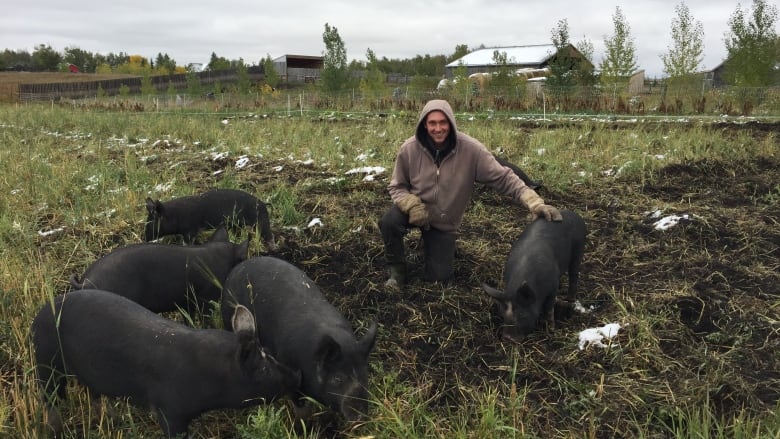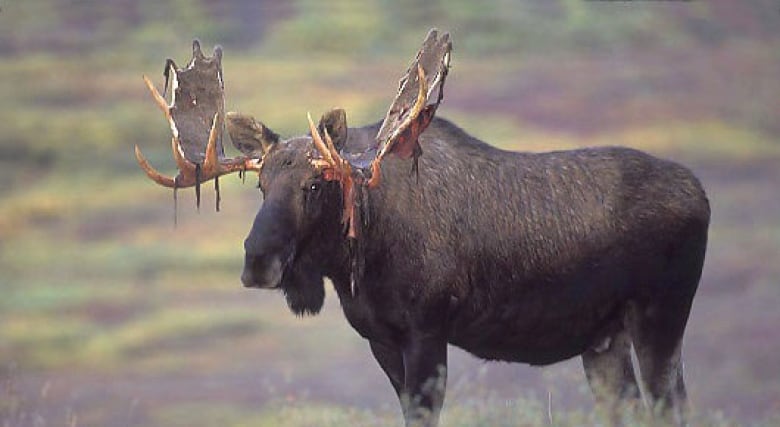CBC News: Meat rules need relaxing, say some Alberta producers and hunters

Takota Coen is advocating for the right to sell the meat of animals that have been slaughtered on his farm. (Josee St-Onge/CBC)
by Josee St-Onge, CBC News | Sep 25, 2018
Current laws only allow sale of meat from animals killed in approved slaughterhouses
Homegrown is a series that looks at how Alberta’s local movement is changing buying habits, connecting people and shaping communities. Share your story ideas with the Homegrown team by writing to josee.st-onge@cbc.ca
Sending his animals to be killed at a slaughterhouse is the worst part of Takota Coen’s work as a young producer. He’s advocating for a change to the rules that force him to do it.
“All producers struggle with the stress that their animals have to go through on butcher day,” said Coen, who raises cows, pigs, and chickens on his family farm near Camrose, Alta.
“It’s very challenging for us to see them go through that. All the hard work that we’ve done to care for them and to make sure that all their needs are looked after, and on the last day, it gets thrown out.”
Alberta’s Meat Inspection Act requires all animals destined for sale to be killed and processed in a provincially approved slaughterhouse.
The law also applies to animals that have been killed on a hunt, meaning that restaurants aren’t allowed to sell wild game to their customers.
It’s time to rethink those rules, said Kevin Kossowan, an Edmonton hunter and filmmaker.
“A baby step would be to allow progressive restaurants that want to bring those flavours and ingredients into their kitchens, allow them a one-off, or some type of annual thing, to allow people to wrap their minds around it culturally,” said Kossowan.
Stressful transportation
Coen is asking for the right to harvest his animals on his farm, which would eliminate the need to transport them to a slaughterhouse.
“There’s just no way that you can load an animal on a trailer and drive it down the highway at 100 km/h without there being some stress involved.”
When the animals experience stress, they release hormones like adrenalin which taints the meat, Coen explained.
He’s reaching out to other producers to start a conversation about how the rules could be amended to allow producers to harvest their animals on the farm.
“We’re open to discussing the Alberta-specific context, meeting with other producers, starting a dialogue around this, but with the goal being a stress-free humane harvest for animals in Alberta,” he said.
Coen has launched an online campaign to spark a dialogue with people connected to the meat industry.
Different provinces, different rules
The government is not currently looking to change the guidelines for the slaughter of meat intended for sale, according to Alberta Agriculture.
The rules are different in other provinces.
In Saskatchewan, livestock raised and slaughtered on-farm can be sold directly to a consumer at the farm.
“This allowance is based on the consumer being aware that the meat is not inspected and has the right to make a decision to purchase or not,” government spokesperson Dale Hunter said in an emailed statement.
In British Columbia, producers can obtain different classes of slaughter licences that allow them to sell animals that were killed on-farm.
A class E licence, for example, allows on-farm slaughter for direct sale to consumers.
Sales are restricted to the region in which the meat was produced and operators are only permitted to slaughter their own animals.
One of those models could be adopted in Alberta, or the province could design its own system, Coen suggested.
“The more options consumers have, the more robust of a local food system we’re going to have.”
Cultural shift
Changing the status quo when it comes to meat rules will require a cultural shift, said Kossowan.
“Our law would have to evolve a lot, and people’s thinking would have to evolve a lot.”
While selling wild game to customers may seem strange in Alberta, moose meat is a regular fixture on menus in Newfoundland.
Hunters need to obtain a wild game licence from the province. They can sell moose meat to anyone who holds a wild meat service licence.
Brenda O’Reilly, who owns O’Reilly’s Pub in St.John’s, offers several moose dishes on her menu.
“For me, it’s always been about promoting local food, and moose is a part of that,” said O’Reilly.
“I personally think it’s great meat. Tourists love it, but the locals really love it. It’s a great tradition in Newfoundland.”
Moose meat is so popular that sourcing it is a challenge.

Moose is an important game animal in Newfoundland, with approximately 22,000 being harvested yearly, according to the province’s Fisheries and Land Resources department. (gssafaris.com)
“We can only buy as much moose as we can get from whoever wants to part with their moose,” said O’Reilly.
Alberta could look at implementing a similar system for some species, said Kossowan.
Introducing wild meat in Alberta’s restaurants could also help educate people about the environment.
“If people cared more about the species that live in those places, they would probably care more about the land that we have,” he said.